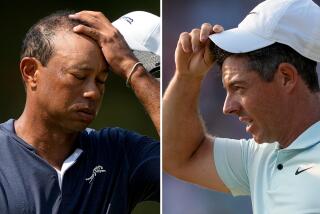In Modern Golf, You Can’t Throw Out the First-Round Leaders
- Share via
PALM DESERT — The early rounds of a 5-round golf tournament are like the first few rounds of a heavyweight championship fight. A lot of clinching, jabbing, shoving, bobbing, weaving. A reluctance to close with your opponent, to wake him up, to dare him. You don’t throw any crazy rights, you don’t go for the quick knockout, you protect yourself at all times.
Oh, you make birdie if you can, but you don’t risk a double bogey to do it. You tend to take the high-percentage way around the course. You hit for the fat part of the green, away from the water, around, not through, trouble.
But even in this heyday of no-star golf, you would think the doings of one or two key players would filter through the clubhouse or press room the way they used to. It was not so long ago that, even in a sorting-out first round, the buzz would go through a club: “What is Hogan doing?” Or, “Anybody hear a score on Snead?”
A golf tournament was not under way until a Palmer watch had been set up. Or a Nicklaus or Trevino information network had been established. And then, latterly, no golf gallery would go a hole without checking, “Has Raymond (Floyd) gone off yet?” or, “What hole is Greg (Norman) on?”
You had to see what Johnny Miller was up to before you could write your lead in the press tent. Johnny might cobble it up for you by coming in with a 61 late in the day.
Tournament golf has become such a crapshoot, you don’t hear that anymore. A golf field is like a claiming race at Caliente. You stick a pin in a program. You don’t really see how any of them can win it. I mean, nobody hurries over to a leader board to see if Shawn McEntee or Brian Tennyson is making a run at the leaders.
One consequence is, you no longer throw out the unknown first-round leaders. The attitude used to be of no-names atop the leader board: “Very cute. But you don’t belong there. Wait till Saturday night. Order will be restored.”
There were, at last count, 11 first-time winners on the PGA Tour last year. It’s not a tour, it’s a lottery. It probably has less form than anything in the whole firmament of sport at the moment. The ribbon clerks don’t get scared out of this pot. They see and raise.
They’ve got a whole lot of U.S. Open winners in this field at the Bob Hope Chrysler Classic this week. They’ve got a couple of British Open winners. It’s awash with former Masters winners.
Nobody’s in a hurry to bet any of them.
When Andy Warhol said that everybody in the United States was going to be famous for 15 minutes, he must have had the PGA Tour in mind. It’s the world’s biggest Alphonse-Gaston act. So nobody was yawning when word filtered down early that a young nobody named David Ogrin was leading the tournament.
The good news about David Ogrin was that he had never won a PGA tournament. Which makes him practically an “out” price to win here, the way things have been going on the tour. Besides, he has only been on the Tour 7 years. What is he, a machine?
David is about as average as you can get in today’s golf. Naturally, he’s blond. Plays out of Texas but comes from Illinois. So he lives and dies with the Chicago Cubs, a la Raymond Floyd. Ogrin’s greatest fear is not a ball in the water in a playoff but that a player the Cubs traded to Texas will suddenly hit .380 next year.
David Ogrin is not leading this tournament, but his opening 68 on a windy, blustery day at Bermuda Dunes puts him squarely in position.
David has no illusions about being the next Ben Hogan. He knows he has a better chance of being the next Ben Franklin. He knows where he fits.
“I make $138,000 on the tour and everybody comes up and says, ‘Great year!’ ” he says. “Bob Tway makes $368,000 and everybody comes up and says ‘What’s wrong with Bob Tway?’ ”
For a non-winner on the tour, Ogrin became a minor celebrity in his first year in the game when a golf magazine printed his rookie’s diary.
“I dumped all over Las Vegas,” he admits, only somewhat ruefully. “The town, not the golf course. Then, I blasted on Memphis. The golf course, not the town. Then, I almost won my first tournament at Memphis. I finished second in 1985. I lost a playoff to Hal Sutton.”
His candor cost him $1,000, the fine levied for “shedding unfavorable light on the players and the sponsors.”
Recalls Ogrin: “The old-timers would admit, ‘What Ogrin says is true. But I would never say it.’ ”
Ogrin is not only more careful with what he says but how he plays. His game is patience, he says, but he is satisfied with his progress up the ladder.
“I’m happy with my 6 years. Golf is a game which can’t be rushed.”
No one can accuse David Ogrin of rushing it.
“Coming back to a course year after year is like going back to old friends,” he says. “You get more comfortable each time.”
He also likes to point out that he made the cut--shot well enough to stay in the tournament from start to finish--20 times last year. This is a long way from Byron Nelson’s 113 straight cuts or Jack Nicklaus’ 105. His game, of course, may always stay well short of Nicklaus’ or Nelson’s. It may not even catch up with Joey Sindelar’s.
First of all, he has to catch up with leader Fred Couples here this week. And then get to the point where, some year, he will rack up a half-million or so in a year’s earnings and have someone come up and say, “What’s wrong with David Ogrin?”
More to Read
Go beyond the scoreboard
Get the latest on L.A.'s teams in the daily Sports Report newsletter.
You may occasionally receive promotional content from the Los Angeles Times.










